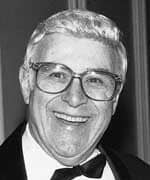





Top Left to Right: Roy Unger , John Portman, Gordon Segal
Bottom Left to Right: Alex Bernhardt, Donald Belgrad, Donald Flanders
The American Furniture Hall of Fame Foundation, Inc. announces the 2011 Industry Fellows and candidates for election into the American Furniture Hall of Fame. The voting period begins July 8 and ends August 5. Only members of the organization are eligible to vote.
The six nominees who will be made Industry Fellows are: Donald A. Belgrad, George Alexander Bernhardt, Donald G. Flanders, Sr., John C. Portman, Jr., Gordon Segal and Roy B. Unger.
“There is tremendous diversity in the background of each person on this year’s slate with one common thread: they all represent the pinnacle of their fields and they all represent individuals of great leadership, innovation and generosity,” says Kurt Darrow, president of the Foundation. “When you read their full bios, it is humbling and immediately apparent that each one is more than worthy of the honor of being made an Industry Fellow. This is a slate of industry giants.”
Under the new selection system, the inductees will be determined by the combination of a vote of the membership and a points-based rating system of each nominee by the Foundation’s Industry Fellow Selection Committee. New members will be announced and officially inducted into the American Furniture Hall of Fame at the annual banquet celebration on October 23, 2011 at the High Point Market.
The candidates were selected from open nominations and the Industry Fellows Selection Committee based on their contributions to the growth and development of the furniture industry in America with a focus on four standards: enduring excellence, superior accomplishments, innovation and creativity, and philanthropic generosity.
Their backgrounds are as follows:
Donald A. Belgrad (b 1939) has worked tirelessly for industry and philanthropic causes, spending his entire furniture career at Schnadig International Corp. where he built it into the largest U.S. family-owned upholstery producer. He pioneered the correlated approach to upholstery with occasional groups, and then living rooms with dining rooms and bedrooms. Identifying the global manufacturing trend, he quickly established a Chinese subsidiary to ensure quality, production control and supply chain management before orchestrating the sale of Schnadig to Markor International Furniture in 2009.
George Alexander Bernhardt (b 1943) has led Bernhardt Furniture Co. to become an award-winning design leader in residential and contract furniture. During his tenure, he has quadrupled the size of the business founded by his grandfather in 1889, making it the largest high-end furniture company in the United States. Bernhardt Furniture has won nine Pinnacle awards and 32 Best of Neocon awards. The company also was one of the first American manufacturers to import parts and later fully made furniture from Asia.
Donald H. Flanders, Sr. (b 1924) has built two successful careers during the past 60 years, as a champion of both the case goods and casual segments. He and his wife, Phala, founded Flanders Manufacturing Co. with just two employees in 1954. When he sold it in 1969 to become part of Riverside Furniture Corp., it was one of the largest case goods firms in the Southwest. In 1982, Flanders founded Lloyd/Flanders, where he has taken woven outdoor furnishings from a minor part of the casual market to a the backbone category in the industry.
John C. Portman, Jr. (b 1924) helped transform the home furnishings industry, as well as the Atlanta skyline, during a career spanning more than half a century. Portman’s 7 million-sq.-ft. AmericasMart houses one of the world’s largest collections of home furnishings, area rug, gift, and apparel merchandise and hosts 19 markets annually. His Atlanta Decorative Arts Center (ADAC) is among the most successful design centers nationwide. Portman is considered the chief architect of Atlanta’s economic and civic development during the last 50 years.
Gordon Segal (b 1938) built Crate and Barrel from one store in Chicago to an internationally renowned home furnishings business with more than 100 stores in the U.S. and abroad. With a focus on design and a reputation for flawless customer service and integrity, Segal was among the first to buy directly from factories in Europe. He introduced innovative and much emulated methods of visual and product merchandising, dubbed “the Crate and Barrel look”. For decades, Crate and Barrel has been among the nation’s top 20 furniture stores.
Roy B. Unger (b 1921 d 2004), known as “The Father of the Modern Bedding Era” and the industry’s “Ambassador of Sleep,” played a major role in the rise of bedding companies Sealy and Serta during a career spanning more than 50 years. After his retirement, he served as a consultant to Simmons, making him one of the few executives to play key roles at each of the industry’s three largest producers. Unger played important roles in the Sealy Posturepedic and Serta Perfect Sleeper brands’ ascent to prominence. One of the founders of the Better Sleep Council, Unger continued to advocate for the bedding industry until his death at age 83.
The American Furniture Hall of Fame Foundation, Inc. is an international, industry-wide organization founded to honor those individuals whose outstanding achievements have contributed to the continued growth and development of the U.S. furniture industry, as well as to research, collect and preserve our cultural, economic and artistic history. Membership includes eligibility to vote for inductees into the American Furniture Hall of Fame, and the opportunity to help preserve the history and heritage of the industry. The organization is based in High Point, North Carolina at 202 Neal Place, and can be reached at 336.882.5900.